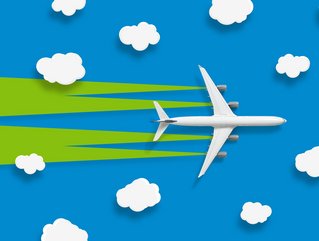Shell, Accenture and AMEX GBT launch blockchain SAF project

Shell, Accenture, and American Express Global Business Travel (Amex GBT) are jointly launching Avelia, one of the world’s first blockchain-powered digital sustainable aviation fuel (SAF) book-and-claim solutions for business travel.
It is billed as the largest SAF book-and-claim pilot at launch, offering around 1mn gallons of SAF – enough to power almost 15,000 individual business traveller flights from London-to-New York.
The pilot phase of the programme aims to demonstrate the credibility of the book-and-claim model, using blockchain technology to ensure secured allocation of SAF’s environmental attributes to companies and airlines after the fuel has been delivered into the fuel network.
With Avelia, airlines and business customers could simultaneously reduce emissions in their respective scopes, while ensuring transparency and accountability by avoiding issues such as double-counting.
Developed by Shell and Accenture, with the support of the Energy Web Foundation (EWF), Avelia includes Amex GBT’s travel management services to aggregate global business demand for SAF, which will increase SAF supply and use and help accelerate the aviation industry’s pathway towards net-zero emissions.
But it remains to be seen if SAF can be produced at scale and, just as crucially, if sustainable fuels can be cheaper to produce than fossil fuels.
Jan Toschka, President, Shell Aviation said although SAF is a key enabler of decarbonisation in the aviation industry, and available today, it’s currently scarce and costs more than conventional jet fuel.
"Avelia will help trigger demand for SAF at scale, providing confidence to suppliers like us to further increase investment in production, and in turn helping to lower the price point for these fuels," he said.
Paul Abbott, CEO, Amex GBT said the partnership means there is a "truly viable route" to decarbonising air travel for business.
"We’re calling on all companies to join us and share the costs and benefits of SAF across the travel and aviation sectors. Airlines will gain access to the buying capacity of businesses, drawing from Amex GBT’s 19,000 customers around the world.”
Rachel Barton, Europe Strategy Lead, Accenture, believes every business should be a sustainable business and that sustainability will serve as one of the most powerful forces for change.
"Our vision for the Avelia platform is to bring together airlines, corporates, cargo players, and SAF suppliers in a trusted ecosystem that no individual company could build or access on its own," she said. "Blockchain technology will be piloted to help ensure trust via data integrity, validate proof of ownership, and enable transparent tracking of the environmental benefits of SAF for customers.”
Shell has committed to purchasing the environmental attributes equivalent to 100,000 gallons of SAF over the pilot phase of the Avelia programme. Shell will increase this commitment as soon as more SAF is available, to achieve its ambition to abate 45% of Shell’s corporate travel emissions through SAF by 2030.
Scalable co-investment models, which allow companies to co-fund the cost of SAF, are crucial to significantly scale SAF supply and use. An industry-accepted carbon accounting mechanism, like book-and-claim, is key for such programmes to credibly grow. Avelia’s data security and credibility are key to reaching scientific and market consensus for ways to allocate SAF’s environmental attributes and help accelerate the decarbonisation of aviation.
Sustainable aviation fuel delivered to New York via petroleum pipelines
Sustainable aviation fuel (SAF) has been delivered to New York's LaGuardia Airport through the Colonial and Buckeye pipeline systems - two essential pieces of American energy infrastructure. The low-emission jet fuel will power a Delta Air Lines flight, marking a seminal moment in the ongoing development and distribution of SAF in the U.S.
"SAF is the most effective tool we have to decarbonise our industry," said Pamela Fletcher, Delta's Chief Sustainability Officer. "These efforts show how existing infrastructure can be used to transport SAF to East Coast airports and drive down emissions - a critical step as we move toward a more sustainable future for air travel."
This partnership between Delta, Neste, Colonial Pipeline and Buckeye Partners demonstrates the long-term viability of SAF and the airline industry's journey towards net zero. Importantly, it shows that SAF can go anywhere there is an existing pipeline currently carrying fossil jet fuel.
Southwest Airlines Co. recently announced an investment into SAFFiRE Renewables, a company formed by D3MAX, as part of a Department of Energy (DOE)-backed project to develop and produce scalable SAF.
The German Federal Ministry of Education and Research (BMBF) and Sasol are undertaking the CARE-O-SENE (Catalyst Research for Sustainable Kerosene) research project, which is aiming for large-scale commercialisation of green kerosene production by 2025.
No 'silver bullet' to sustainable aviation
As the SAF industry innovates, costs will decline. Facilities will scale, technologies will mature, and inputs such as green electricity will become less costly, according to McKinsey.
"There is no silver bullet, however - no single feedstock or production pathway will be practical in every geography or yield enough SAF to meet all demand," it states. "Even as costs fall, SAF will almost certainly remain more expensive to produce than fossil fuel."
To make SAF economically viable and scale production, several advances will be required: a supportive regulatory framework, measures to stimulate demand from corporate and private customers, and innovative ways to finance the transition.






